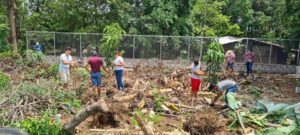“Sometimes you have to suffer in life to know the value of life.”
Esta historia se escribe en Español = This story is also written in Spanish here.
Editor’s Note: Tito’s engaging smile punctuates his charming personality. He is a successful businessman who never forgets his humble roots. He has experienced his fair share of nail-biting close calls flirting with danger but thanks God that he got through them and learned from them.
Being a family man is an understatement for Tito. He is in business with ALL of them – parents, siblings, in-laws, and children. But he laughs saying the brothers made a decision early in their business venture that their wives would have no place in the decision-making part of the business – a franchise of the famous Bazzini Nuts started in 1886 in the Bronx, NYC. (Every Rotary meeting in his branch in San Salvador begins with drinks, Bazzini nuts, and dried fruits courtesy of Tito.)
Likewise, Tito extends himself to anyone needing help he encounters; often he does this on his own. I know because I was lucky enough to be the recipient when in a pinch. Other times it is through organizations such as the Rotary. He is key to finding the best ways to stretch a finite amount of money to use it for multiple items within a campesino community where needs are extensive. What I admire about Tito is he works as a team member with engineers, architects, and others on projects without letting his ego or his skills take control.
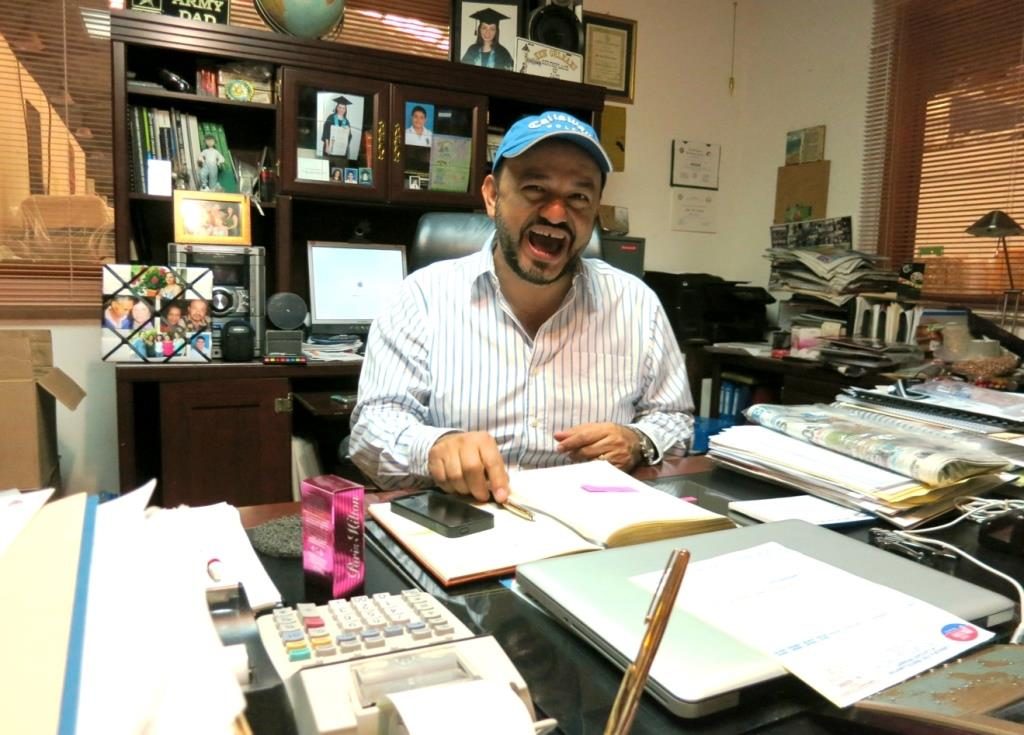
Tito working in his office
MY BACKGROUND AND EDUCATION:
I was born on January 24, 1962 in San Salvador and have three siblings; my parents were REALLY poor. My mom ran a small store in our house located near the university, and my dad was a policeman. He was a decent man who refused to take bribes. I didn’t understand why my friends whose dads were also policemen were so much better off than we were. When I was a teenager, I found the courage to ask him, and his response was, “I’m not stealing money from the people.” I realized he was honest and honorable rather than corrupt. That is why we were living so poorly; we were living off his salary only, no bribes. He was a good man, and thanks be to God, he quit the police force in 1982 – at the beginning of the civil war – because he didn’t like what he saw happening. He had strong morals and could not do what the police were asked to do.
For three years I went to a technical school in San Marcos studying electronics which included architectural skills. At age 18 I was planning to go to university, but as the civil war developed, my parents did not want me involved; so they sent my brother first to the U.S. and then three months later sent me.
TIME IN THE U.S.:
I was among a group of 60 led by four coyotes to get us across the border into California. The coyotes told the men to cross over first and to run fast. They instructed the women and children to go next. The men made it safely between 10 PM and 4 AM, but the immigration officials caught the women and children because the children were frightened hiding under the grass and cried, “Please don’t shoot me” causing their capture. Three months later they successfully made it. My uncle gave me some cash to use when I got into the U.S.
My first job was working in the agricultural sector in the Sacramento area picking watermelon. I was 18 years old and was fired because I was unable to keep up the pace required by the job.
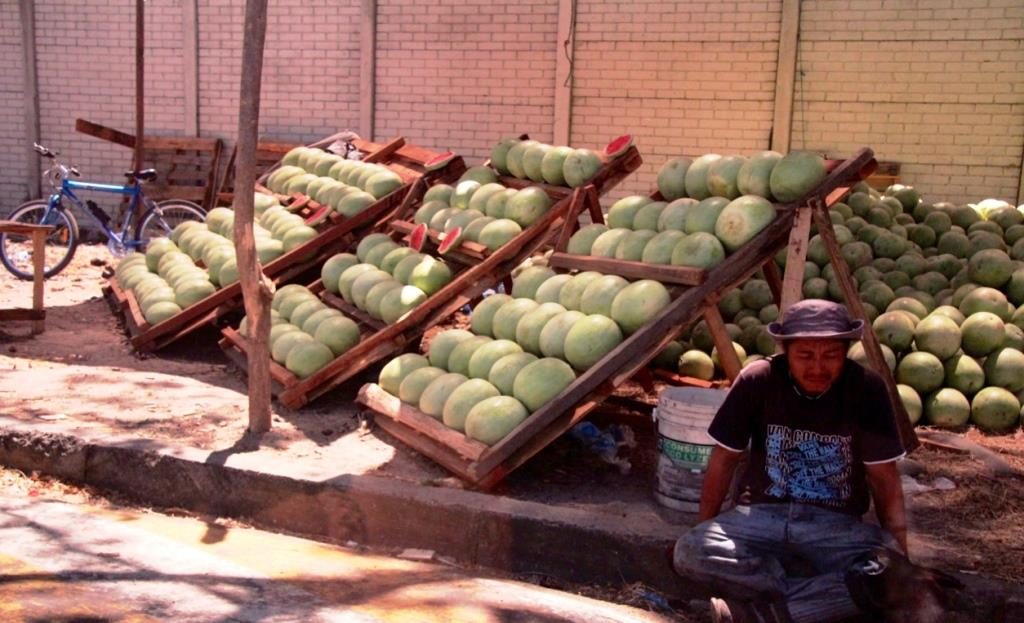
I called my brother who offered me a job at a gas station in a dangerous black neighborhood where I was in a locked station. It took me two hours to travel there by bus; I worked a 12-hour shift and then traveled another two hours home making 16 hour days my norm.
The next job I got was driving trucks. I learned to read maps to make deliveries of empty plastic and glass bottles for a year. I was 19 years old. Then I began driving 18-wheelers, which forced me to lie about my age because the required minimum age was 20 to do that job. I worked for six years driving across California and Arizona earning $2,000 a week, but I was illegal.
When I lived in the U.S., I made lots of money but I chose to drive a little old car that people laughed at telling me to buy a bigger new car because I could afford it. But I had a purpose and goal which was saving my money. Now that I have a business these same people are driving old trucks and see I’m in a different position. You have to sacrifice if you want something.
I consider the U.S. as my second country. I travel back and forth on a visa to haul equipment for my work and am very law abiding and respectful in the U.S. I love it there and learned many good things the U.S. has to offer, including the value of money and the value of a person who, despite having nothing, still has the same rights. Everyone has dignity. Everyone works so hard and it changed my life and I really appreciate that.
The only thing I witnessed in the U.S. that I didn’t like was discrimination against blacks, Hispanics, and those who don’t speak English. Once when traveling by truck to El Salvador, I had mechanical issues in Mississippi and pulled off the side of the road to check the noise my truck was making. Some locals pulled up beside me and threatened me that I had 10 minutes to go and if I was still there, they would kill me. Fortunately I got the truck moved a short distance away to fix it later.
MARRIAGE AND FAMILY:
In 1982 when I married a Salvadoran girl in the U.S. who was also an illegal, I said, “I can’t be hiding from immigration all the time; I have money; let’s return to El Salvador.” That’s what we did. We waited two years to start a family so that we could enjoy one another. Our first daughter arrived in 1984. The day our first daughter was born I witnessed the most amazing things in my life. Our second one “was built” in the U.S. but born here in El Salvador. Two years later during the civil war another child arrived, and we felt the next one should be born in the U.S. I have four children – three daughters and a son.
I accept and respect all religions because there is one God. My wife and I always believed in Jesus Christ. We sent our children to a Baptist school for them to learn better values, and I’m glad we did that. Our children went to church until their teen years. At that point the many competing activities interfered, and we did not force them to attend worship after that.
MOVING THE BUSINESS TO EL SALVADOR:
My brother had moved to New York to follow his girlfriend whom he married and who worked for Bazzini Nuts Co. He thought we could start a franchise of the company in El Salvador, so that’s what we did. In 1988 my brother and I moved all the equipment needed for the operation from NYC in trucks here to El Salvador: roasters, packing machines, everything you need for the business. The owners took a chance that we would do well. We had one small warehouse and in 1992 started selling nuts to airlines and supermarkets. Realize this country had never snacked on nuts before, so we had to develop marketing strategies in a culture that had never eaten nuts. We taught them it was a healthy snack. Now we have 175 employees directly involved in the production and 2,000 employees indirectly involved including drivers, administrators, salespersons, security, and distributors. We have a distribution plant in Guatemala.
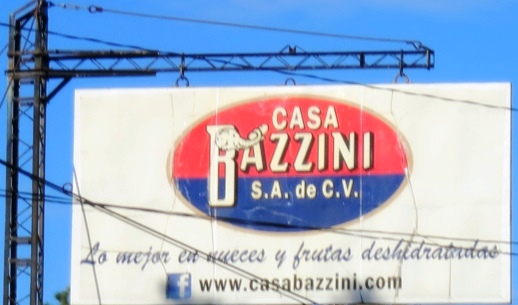

Nut preparation for roasting
HOW REFLECTING ON YOUR LIFE IMPACTS ON YOUR BUSINESS DECISIONS:
Prior to this country’s civil war there were many bad things for the poor people, especially those working in the agricultural area who suffered the most. For example, the owners of the coffee fincas treated their workers like slaves. They could go nowhere off the finca and had no chances. They were not even treated like human beings. The system had to be changed and developed in order for the country to improve.
When we set up our business, I knew we needed to treat our workers fairly. I saw firsthand in the U.S. how illegal workers are taken advantage of, and I did not want to do that in my own business. This meant giving them vacation and Holy Days off, for example. If our workers are happy, they will contribute to our business.

Tito’s office staff
I also had a good role model for honesty in my dad, perhaps one of the few on the police force who never accepted bribes. Knowing my family as I do, they are the people I can and do trust in the business. We are hard workers and all work together in various roles. We brothers decided that our wives would not make the business decisions, though. (He laughs.)
CLOSE CALLS:
Eighteen years ago my brother and I were in Guatemala when a pickup truck tried to hit us and held us. For six hours the drivers punished us asking for drugs and money. They were POLICE! Finally when they searched us, they took away our valuables warning us not to say anything to anyone for an hour or they’d return to kill us. This happens frequently to vehicles with Salvadoran license plates traveling in Guatemala. For that reason we now have a company in Guatemala, giving us the right to have Guatemala tags on our vehicle. We don’t ask ourselves, “Why is this happening to me?” or blame ourselves. We don’t have time to spend in Guatemalan courts. You learn to protect yourself. NEVER travel to Guatemala with plates from another country!
Our family had a grueling experience involving our daughter, Marcella’s internet predator. She graduated from university and was trying to find a way to study in the U.S. when she met a guy on the internet who was making promises if she went there. His luring her was inviting to her, but what she didn’t know was he was baiting her into an abusive relationship. My wife and I knew nothing about this until it was too late and she already left the country. She was 26 and left us a note asking us to respect her decision. I was really, really mad and prayed for her. I called her asking her to please not marry him because she knew nothing about him. But she didn’t listen to me and did marry him. He was born in Ecuador but was also a U.S. citizen. We lost communication until Marcella called my sister in Stockton, California, asking her to tell me she was suffering from his abuse. I sent money immediately to get her out of the house and to my sister’s place. She was sick and pregnant. I left as soon as all the information unraveled and literally rescued her by taking her to the hospital and a week later bringing her back here to El Salvador. She was considered to be a high-risk pregnancy. We found out this guy was already married. Someone advised her to go to the U.S. Embassy here which we did. The understanding woman she spoke with advised her to deliver the baby in the U.S. where the laws could protect the child and give it U.S. citizenship; she could press charges against the man because she was an illegal abused by a U.S. citizen. That was two years ago.
When you believe in God, He gives you powers and puts people into your life to help you. I pray to God to help me make the right decisions. I feel so blessed by God for getting through the bad moments and for knowing sometimes you have to suffer in life to know the real value of life.
GOING FORWARD:
This is the best decade of my life because my children are all grown up and I can enjoy them. I wish I could be as positive about the current situation of my country. All the political powers must work together to improve the security of the country and keep control. People no longer trust the police to solve the problems. We need more opportunities for our youth. When they turn to violence and go to prisons, the conditions are dehumanizing, and they end up being mistreated. We need to offer better environments with opportunities to develop trust.
Our business is expanding in new directions to possibly include another product. A new opportunity we are exploring is producing nonpareil dark chocolate candy. A guy offered to buy a million pounds of it, so we are in the process of purchasing the equipment from China we need to produce it. We must always look ahead.
Editor’s Note: Tito works tirelessly both on his own and through Rotary International to install water tanks and sanitation systems in campesino communities that live without them. He shows us a community living in simple mud homes which he is working toward replacing with more substantial block structures. Tito is committed to improving the lives of his fellow Salvadorans. He also supports a young man whose dream is to provide sustainable farming for the homeless. These are a few of the projects we know about!

Mud houses in rural community
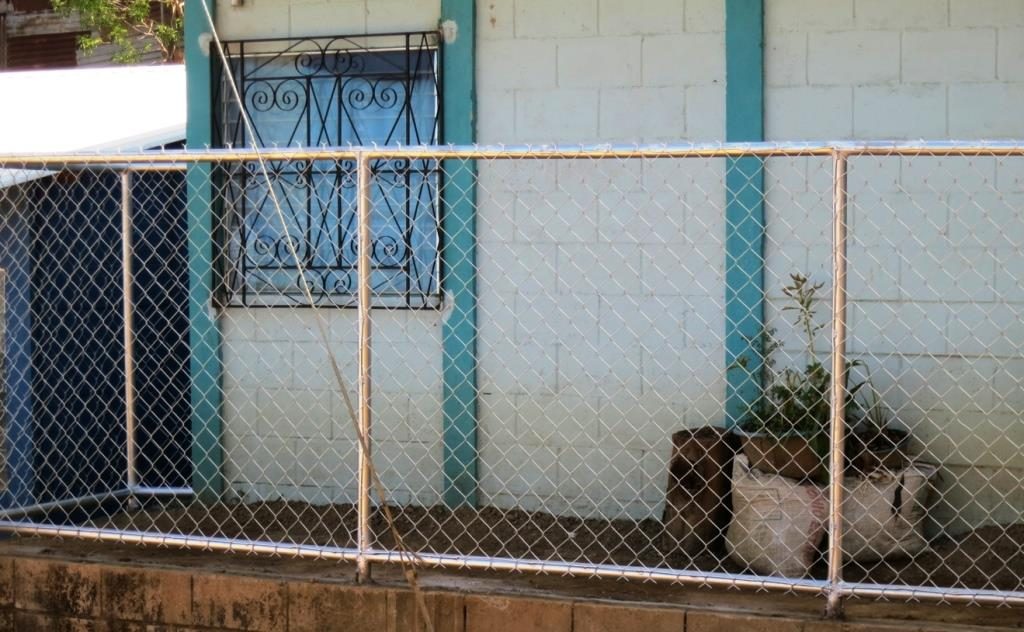
More substantial/durable concrete houses Tito is building to replace the others


